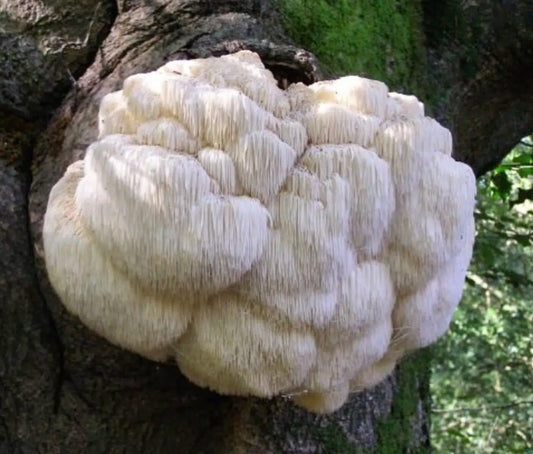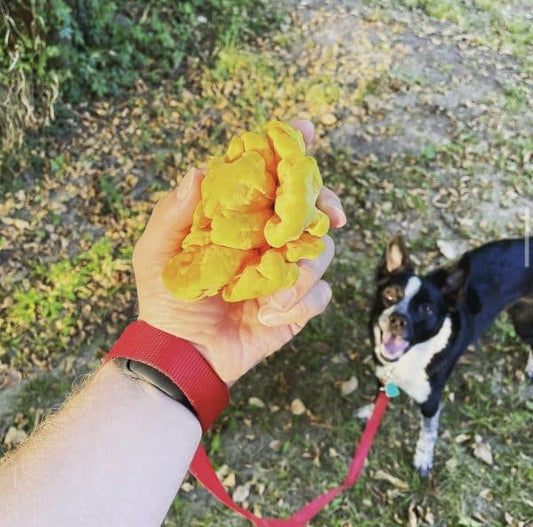Shiitake mushrooms are native to East Asia, fruiting from spring to late summer or early fall. One of many interesting facts about shiitake mushrooms is that it is a true saprotroph, meaning it feeds exclusively on dead tissue. Shiitake mushrooms have a strong preference to feast on broadleaf trees such as the shii tree. Combined with “take”, the Japanese word for mushroom, is how shiitake earned its name. Other less common names for this fungi include sawtooth oak mushroom, black forest mushroom, black mushroom, golden oak mushroom, or oakwood mushroom.
Shiitake mushrooms have been used in traditional medicine and cuisine for centuries, with the earliest recorded use dating back to the Sung Dynasty in China. They have long been considered medicinal mushrooms in Korea, China, Japan, and eastern Russia.¹ Shiitake has been shown to provide a nutritionally significant content of several important vitamins such as B1, B2, B12, C, D, and E.² Since they are a nutritionally rich food, mushrooms have been used in modern times as an alternative dietary protein source in countries that have a high malnutrition rate.
In addition to its health benefits, shiitake is valued for its savory, meat-like taste. No doubt this is why they are now one of the most widely cultivated mushrooms, second only to the common white button. Interestingly, shiitake contain many of the same amino acids as meat.³ While China produces about 80 to 90 percent of all shiitake worldwide, they are also grown in the Americas, both in the United States and Brazil.
Here Are 17 Noteworthy Facts About Shiitake Mushrooms
17. Shiitake Mushrooms Are A Rich Source Of Protein
Shiitake mushrooms boast approximately 3 grams of protein per serving (about 3-4 mushrooms).⁴ The protein content in shiitake reduces the level of the hormone ghrelin, responsible for hunger. It also amps up the levels of peptide YY, a hormone that signals the body it is full. These effects on appetite can be powerful. In one study, increasing protein intake from 15% to 30% of calories resulted in overweight women consuming 441 fewer calories each day without intentionally restricting calories.⁵
16. Shiitake Mushrooms Provide Important Dietary Fiber
Fiber is a type of carbohydrate that is not digested by the body, but rather passes through the digestive system largely intact. It helps to bulk up the stool and promotes regular bowel movements, which can help to prevent constipation and other digestive issues. Shiitake mushrooms supply about 1 gram of fiber per serving.
What makes dietary fiber so valuable? An observational study, which included an average follow-up of 9 years, showed that consumption of dietary fiber is associated with a decreased risk of death from any cause. Participants eating the highest amount of fiber reduced their risk of dying by 23% compared to those eating the least amount of fiber.⁶
15. Shiitake Mushrooms Positively Impact Bone Density
Strong bones enable better posture, which improves appearance and functionality. The body needs vitamin D to build strong bones, due in part to its role in calcium absorption. Yet, very few foods contain vitamin D.
Mushrooms provide one of the only natural sources of vitamin D (supplying it in the form of D2). While the vitamin D levels of mushrooms vary depending on how they are grown, those exposed to UV light have been found to contain enhanced vitamin D2 and much higher calcium content. In fact, in one study, mice that were fed a low-calcium, low-vitamin-D diet developed symptoms of osteoporosis. In comparison, those given calcium and UV-enhanced shiitake had higher bone density.⁷
14. Shiitake Mushrooms Are A Good Source Of Niacin
Niacin, which is also known as vitamin B3, is necessary for the metabolism of carbohydrates, fats, and proteins. According to the Mayo Clinic, niacin is made and used by the body to turn food into energy. It helps keep the nervous system, digestive system, and skin healthy. The recommended daily amount of niacin for adult males is 16 milligrams (mg) a day and 14 mg a day for adult females. The RDA is higher for women who are pregnant (18mg) or nursing (17mg). Just a 15-gram serving of shiitake mushrooms (4 mushrooms) provides 11 percent of the daily value of this important vitamin.⁸
13. Shiitake Mushrooms Top The Charts In Pantothenic Acid
Pantothenic acid, also known as vitamin B5, is involved in the synthesis of hormones and the production of energy. It also plays a vital role in producing, transporting, and releasing energy from fats, as well as in the production of the neurotransmitter acetylcholine. A deficiency of vitamin B5 is rare, however, it can cause headache, fatigue, irritability, restlessness, disturbed sleep, nausea, vomiting, stomach cramps, numbness or burning sensation in hands or feet, and muscle cramps.⁹ The current daily value (DV) for Pantothenic Acid is 5mg. 100 grams of shiitake mushrooms contain 3.6mg, a whopping 72% of the daily value.
12. Shiitake Mushrooms Are Rich In Copper And Selenium
Copper is an essential mineral that supports healthy blood vessels, bones, and immune support. It is also a cofactor for several enzymes that are involved in energy production, iron metabolism, neuropeptide activation, connective tissue synthesis, and neurotransmitter synthesis.¹⁰ Shiitake mushrooms have one of the highest amounts of natural copper. In fact, 1/2 cup of shiitake mushrooms provides 72 percent of the daily recommended intake (DRI). These mushrooms are also a rich source of selenium, providing 33 percent of the DRI.⁸
11. Shiitake Mushrooms Contain Protective Antioxidants
Antioxidants help to protect cells from free radicals that lead to inflammation and other issues.¹¹ A balance between free radicals and antioxidants is essential for proper physiological function. If free radicals overwhelm the body’s ability to regulate them, oxidative stress ensues. This results in an adverse alteration of lipids, proteins, and DNA, triggering a number of diseases. Shiitake mushrooms naturally contain antioxidants which perform the important work of neutralizing free radicals, thus preventing oxidation.¹²
10. Shiitake Mushrooms May Have Immune-Boosting Effects
Shiitake mushrooms contain various polysaccharides, among which is lentinan. This important component may serve to strengthen the immune system.¹³ In one study, participants were given two dried shiitakes daily. After just one month, their immune markers improved.¹⁴ Weakening immune systems are a particular worry as we age. Yet, a study on mice found that a supplement derived from shiitake helped to reverse some age-related decline in immune function.¹⁵
9. Shiitake Mushrooms May Improve Heart Health
A study published in the Journal of the American College of Nutrition found that consuming shiitake mushrooms regularly was associated with lower levels of LDL cholesterol (also known as “bad” cholesterol) in participants.¹⁶ Additionally, a study demonstrated that mice fed shiitake along with their high-fat diet developed lower cholesterol levels than those that didn’t consume the mushrooms.¹⁷
Key compounds found in shiitake mushrooms that have been linked to lower cholesterol are eritadenine, which inhibits an enzyme involved in cholesterol production; sterols, molecules that help block cholesterol absorption in the gut; and beta-glucans, a type of fiber that can lower cholesterol.¹⁸ ¹⁹ ²⁰

8. Shiitake Mushrooms Have Anti-Cancer Properties
Shiitake mushrooms contain compounds called lentinan and Lentinula edodes mycelium (LEM), which have been studied for their potential anti-tumor effects through the mechanisms of both inhibiting the growth and the spread of cancer cells.²¹ ²² The polysaccharide lentinan helps fight tumors by activating the immune system.²³ ²⁴ It has also been shown to inhibit the growth and spread of leukemia cells.²⁵
In China and Japan, an injectable form of lentinan is already being used alongside chemotherapy and other major cancer treatments to improve immune function and quality of life in people with gastric cancer.²⁶ ²⁷Researchers suspect that lentinan prevents enzymes from metabolizing carcinogens in the stomach and colon into more active forms. As a result, shiitake mushrooms are seen as especially beneficial for those suffering from stomach and colorectal cancers.
7. Shiitake Mushrooms Possess Promising Antibacterial And Antiviral Effects
Several compounds in shiitake have been discovered to provide antibacterial, antiviral, and antifungal effects.²⁶ ²⁸ As antibiotic resistance is growing, it is important to explore the antimicrobial potential of shiitake.²⁹
6. Shiitake Mushrooms Have Been Found To Reduce Inflammation
In the aforementioned study, the participants who received two dried shiitakes daily experienced decreased inflammation levels within just one month.¹⁴ Since systemic inflammation is one of the main driving causes of disease, reducing inflammation is the key to disease prevention. Anything that is able to reduce inflammation plays a critical role in maintaining good health as we age.
5. Shiitake Mushrooms May Reduce The Risk Of Gout
Research suggests that eating mushrooms, such as shiitakes, is linked to a lower risk of gout.³⁰ A Taiwanese study investigated trends in uric acid levels, hyperuricemia (a recognized risk factor for cardiovascular disease), and gout among adults. Frequent consumption of mushrooms, fruit, and coffee was found to be connected with a reduction in the occurrence of gout.
4. Shiitake Mushrooms Can Lessen Development Of Liver Fat
A study in lab rats fed a high-fat diet demonstrated that those given shiitake developed less fat in their livers.¹⁷Moreover, these precious fungi contain compounds that inhibit the absorption and production of cholesterol in the liver.
3. Shiitake Mushrooms May Prevent High Blood Pressure
One study in rats with high blood pressure found that shiitake powder prevented an increase in blood pressure. What’s more, the phytonutrients contained in shiitake mushrooms have been shown to contribute to the maintenance of healthy blood pressure and circulation.³¹
2. Shiitake Mushrooms May Lessen Artery Plaque
A study in mice fed a high-fat diet demonstrated that those given shiitake developed less plaque throughout their artery walls.¹⁷ This highly beneficial prevention of plaque buildup is believed to be rooted in the phytonutrients found in shiitake mushrooms.
1. Shiitake Mushrooms Have Long Been Valued By Traditional Chinese Medicine
Traditional Chinese Medicine (TCM) practitioners recommend eating shiitake mushrooms to relieve symptoms of stress and anxiety, promote better skin and hair health, and strengthen the immune system.
In Traditional Chinese Medicine, shiitakes are often used to treat disorders of the spleen and stomach, including those related to poor digestion, such as indigestion and weak immunity. According to TCM, shiitake improves blood circulation in digestive organs such as the liver, stomach, and intestines, which in turn promotes better absorption of nutrients. Doctors in China have even prescribed shiitakes to treat a variety of infections caused by bacteria and viruses, including infections caused by HIV, tuberculosis, and the common flu.
17 Facts About Shiitake Mushrooms
Shiitake mushrooms are truly a valuable storehouse of beneficial nutrients that are an excellent choice for those looking to manage their weight and improve their health. These facts about shiitake mushrooms make the case that consumption is one critical aspect of achieving optimal health. Shiitake mushrooms, along with Oyster mushrooms and Lion’s mane mushrooms should be all included in a balanced diet.
If you want to grow your own Shiitake mushrooms, here’s a beginner guide on mushroom substrates.
References
- Lull, C., Wichers, H.J. and Savelkoul, H.F. (2005) Antiinflammatory and Immunomodulating Properties of Fungal Metabolites. Mediators of Inflammation. http://dx.doi.org/10.1155/MI.2005.63
- Heleno, S.A., Barros, L., Martins, A., Queiroz, M.J., Santos-Buelga, C. and Ferreira, I.C. (2012) Phenolic, Polysaccharidic, and Lipidic Fractions of Mushrooms from Northeastern Portugal: Chemical Compounds with Antioxidant Properties. Journal of Agricultural and Food Chemistry. http://dx.doi.org/10.1021/jf300739m
- Guillamón, E; García-Lafuente, A;Lozano, M; D´Arrigo, M; Rostagno, M; Villares, A; Martínez, J.A. (2010, January 10) Edible mushrooms: Role in the prevention of cardiovascular diseases Centro para la Calidad de los Alimentos. https://doi.org/10.1016/j.fitote.2010.06.005
- Finimundy, T.C., Dillon, A.J.P., Henriques, J.A.P. and Ely, M.R. (2014) A Review on General Nutritional Compounds and Pharmacological Properties of the Lentinula edodes Mushroom. Food and Nutrition Sciences. http://dx.doi.org/10.4236/fns.2014.512119
- Weigle DS, Breen PA, Matthys CC, Callahan HS, Meeuws KE, Burden VR, Purnell JQ.(2005, July) A high-protein diet induces sustained reductions in appetite, ad libitum caloric intake, and body weight despite compensatory changes in diurnal plasma leptin and ghrelin concentrations. Am J Clin Nutr. https://pubmed.ncbi.nlm.nih.gov/16002798/
- Park Y, Subar AF, Hollenbeck A, Schatzkin A. (2011, June 27) Dietary fiber intake and mortality in the NIH-AARP diet and health study. Arch Intern Med. https://pubmed.ncbi.nlm.nih.gov/21321288/
- Lee GS, Byun HS, Yoon KH, Lee JS, Choi KC, Jeung EB. (2009, March) Dietary calcium and vitamin D2 supplementation with enhanced Lentinula edodes improves osteoporosis-like symptoms and induces duodenal and renal active calcium transport gene expression in mice. Eur J Nutr. https://pubmed.ncbi.nlm.nih.gov/19093162/
- USDA. (2019, April 1) https://fdc.nal.usda.gov/fdc-app.html#/food-details/168436/nutrients
- Harvard T.H. Chan School of Public Health. https://www.hsph.harvard.edu/nutritionsource/pantothenic-acid-vitamin-b5/
- National Institutes of Health. https://ods.od.nih.gov/factsheets/Copper-HealthProfessional/
- Diallo,I. Boudard,F. Morel,S. Vitou,M. Guzman, C. et al.. (2020) Antioxidant and Anti-inflammatory Potential of Shiitake Culinary-Medicinal Mushroom, Lentinus edodes (Agaricomycetes), Sporophores from Various Culture Conditions. International Journal of Medicinal Mushrooms. https://pubmed.ncbi.nlm.nih.gov/32865895/
- Lobo V, Patil A, Phatak A, Chandra N. (2010, July) Free radicals, antioxidants and functional foods: Impact on human health. Pharmacogn Rev. https://www.ncbi.nlm.nih.gov/pmc/articles/PMC3249911/
- Xu X, Yang J, Luo Z, Zhang X. (2015, June) Lentinula edodes-derived polysaccharide enhances systemic and mucosal immunity by spatial modulation of intestinal gene expression in mice. Food Funct. https://pubmed.ncbi.nlm.nih.gov/26034783/
- Dai X, Stanilka JM, Rowe CA, Esteves EA, Nieves C Jr, Spaiser SJ, Christman MC, Langkamp-Henken B, Percival SS. (2015) Consuming Lentinula edodes (Shiitake) Mushrooms Daily Improves Human Immunity: A Randomized Dietary Intervention in Healthy Young Adults. J Am Coll Nutr. https://pubmed.ncbi.nlm.nih.gov/25866155/
- Xu X, Yang J, Ning Z, Zhang X. (2015, August) Lentinula edodes-derived polysaccharide rejuvenates mice in terms of immune responses and gut microbiota. Food Funct. https://pubmed.ncbi.nlm.nih.gov/26135107/
- Yu S, Wu X, Ferguson M, Simmen RC, Cleves MA, Simmen FA, Fang N. (2016, December) Diets Containing Shiitake Mushroom Reduce Serum Lipids and Serum Lipophilic Antioxidant Capacity in Rats. J Nutr. https://pubmed.ncbi.nlm.nih.gov/27798348/
- Yang H, Hwang I, Kim S, Hong EJ, Jeung EB. (2013 December) Lentinus edodes promotes fat removal in hypercholesterolemic mice. Exp Ther Med. https://www.ncbi.nlm.nih.gov/pmc/articles/PMC3829752/
- Guillamón, E; García-Lafuente, A;Lozano, M; D´Arrigo, M; Rostagno, M; Villares, A; Martínez, J.A. (2010, January 10) Edible mushrooms: Role in the prevention of cardiovascular diseases Centro para la Calidad de los Alimentos. https://doi.org/10.1016/j.fitote.2010.06.005
- Bak WC, Park JH, Park YA, Ka KH. (2014 September) Determination of Glucan Contents in the Fruiting Bodies and Mycelia of Lentinula edodes Cultivars. Mycobiology. https://www.ncbi.nlm.nih.gov/pmc/articles/PMC4206800/
- Phillips KM, Ruggio DM, Horst RL, Minor B, Simon RR, Feeney MJ, Byrdwell WC, Haytowitz DB. (2011, June 23) Vitamin D and sterol composition of 10 types of mushrooms from retail suppliers in the United States. J Agric Food Chem. https://pubmed.ncbi.nlm.nih.gov/21663327/
- Huang X, Nie S. (2015, October) The structure of mushroom polysaccharides and their beneficial role in health. Food Funct.https://pubmed.ncbi.nlm.nih.gov/26345165/
- Xu T, Beelman RB, Lambert JD. (2012, December) The cancer preventive effects of edible mushrooms. Anticancer Agents Med Chem. https://pubmed.ncbi.nlm.nih.gov/22583406/
- Meng, X. Liang, H. Luo, L. (2015, November 24) Antitumor polysaccharides from mushrooms: a review on the structural characteristics, antitumor mechanisms and immunomodulating activities. School of Bioscience and Bioengineering. https://pubmed.ncbi.nlm.nih.gov/26974354/
- Xu X, Yan H, Tang J, Chen J, Zhang X. (2014) Polysaccharides in Lentinus edodes: isolation, structure, immunomodulating activity and future prospective. Crit Rev Food Sci Nutr. https://pubmed.ncbi.nlm.nih.gov/24236998/
- Patel S, Goyal A. (2012, March) Recent developments in mushrooms as anti-cancer therapeutics: a review. 3 Biotech. https://pubmed.ncbi.nlm.nih.gov/22582152/
- Lindequist U, Niedermeyer TH, Jülich WD. (2005, September) The pharmacological potential of mushrooms. Evid Based Complement Alternat Med. https://www.ncbi.nlm.nih.gov/pmc/articles/PMC1193547/
- Ina K, Kataoka T, Ando T. (2013, June) The use of lentinan for treating gastric cancer. Anticancer Agents Med Chem. https://pubmed.ncbi.nlm.nih.gov/23092289/
- Lee, H. Morris-Natschke, S. Yang, X. Huang, R. et al (2012, April-June) Recent progress of research on medicinal mushrooms, foods, and other herbal products used in traditional Chinese medicine. Natural Products Research Laboratories https://www.ncbi.nlm.nih.gov/pmc/articles/PMC3942920/
- Chowdhury M, Kubra K, Ahmed S. (2015 February) Screening of antimicrobial, antioxidant properties and bioactive compounds of some edible mushrooms cultivated in Bangladesh. Ann Clin Microbiol Antimicrob. https://www.ncbi.nlm.nih.gov/pmc/articles/PMC4328533/
- Chuang SY, Lee SC, Hsieh YT, Pan WH. (2011) Trends in hyperuricemia and gout prevalence: Nutrition and Health Survey in Taiwan from 1993-1996 to 2005-2008. Asia Pac J Clin Nutr. https://pubmed.ncbi.nlm.nih.gov/21669599/
- Kabir Y, Yamaguchi M, Kimura S. (1987, October) Effect of shiitake (Lentinus edodes) and maitake (Grifola frondosa) mushrooms on blood pressure and plasma lipids of spontaneously hypertensive rats. J Nutr Sci Vitaminol (Tokyo). https://pubmed.ncbi.nlm.nih.gov/3443885/



